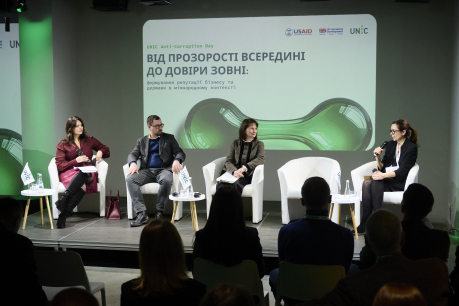UNIC Anti-Corruption Day: How Business Transparency Shapes Ukraine's Reputation on the Path to the EU

On December 17, 2024, UNIC Anti-Corruption Day was held in Kyiv—a large-scale event organized by the All-Ukrainian Network of Integrity and Compliance (UNIC). The event brought together leading experts, business representatives, government agencies, and international organizations to discuss key aspects of forming a sustainable reputation for business and the state in the context of Ukraine's European integration.
The event emphasized how an internal culture of trust and transparency determines the external image of companies and the country as a whole. Topics included the interaction between business and government, reputational security in charitable projects, and best compliance practices in socially significant initiatives.
During the first panel, speakers discussed the topics of business-government relations on the path to economic security and integration into the European Union.
According to Antonina Prudko, Head of the UNIC Secretariat, through cooperation with international organizations, the UNIC team helps Ukrainian companies integrate transparency standards into their activities, which are key to strengthening Ukraine’s reputation. “Business integrity and transparency are key to forming a positive image of Ukrainian business both domestically and internationally. Right now, when Ukraine is striving for integration into the EU and OECD, it is important to support business in implementing anti-corruption practices and creating a culture of responsibility and ethics. UNIC is the bridge that helps business and the state join forces to achieve these goals,” noted Antonina Prudko.
Tetyana Khavanska, Project Manager in Ukraine, OECD, emphasized that a new stage is coming for Ukraine, as the country has a chance to become part of one of the most powerful organizations in the world – the OECD: “This is more than just an economic benefit – it is a matter of international recognition and image. Our standards not only regulate business; they create new rules of the game for state-owned enterprises and even for corporations facing major corruption cases. Therefore, our goal is not only to help Ukraine implement new laws but also to create a real system that does not harm business but, on the contrary, supports its development through transparency and effective management.”
Another important issue for discussion by the participants of the event was the safety of business and its reputation during charity, so the second panel discussion focused on issues of transparency in charitable activities and mechanisms for protecting businesses from fraud. The participants discussed how to establish effective procedures for checking partners and ensuring trust in charitable initiatives. Special emphasis was placed on risks that can harm the reputation of companies and ways to minimize them through responsible management and open communication.
During the third panel, a case study of the restoration of OKHMATDYT was analyzed in detail, in particular, a professional analysis of the compliance component and an analysis of the implementation of this charitable initiative in terms of compliance with transparency standards for risk management. Participants learned how to avoid mistakes and improve compliance practices in cooperation with government, charitable organizations, and business partners.
The UNIC Secretariat sincerely thanks everyone who took part in this important event: partners, speakers, and guests who are united by common values of transparent and responsible business conduct.
For Reference
This event is organized by the All-Ukrainian Network for Integrity and Compliance (UNIC) within the framework of the project “Business Integrity as a Foundation for Sound Recovery”. This project was made possible by the support of the American and British people through the United States Agency for International Development (USAID) and UK International Development as part of the Promoting Integrity in the Public Sector Activity (Pro-Integrity). The contents of this project do not necessarily reflect the views of USAID, the U.S. Government, UK International Development, or the United Kingdom Government.




